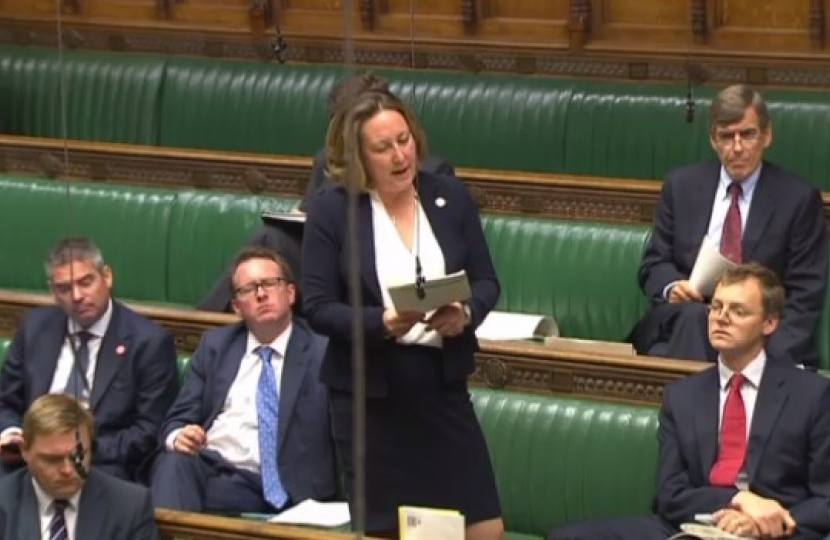
Following last night’s vote in the House of Commons, I thought my constituents would like to understand why I voted against the Prime Minister’s latest “deal”.
In January, I voted against the Prime Minister’s Withdrawal Agreement and Political Declaration, having resigned from Government when it was published in November 2018 because I fundamentally disagree with it. I believe it does not deliver Brexit.
I voted against the “deal” because I believe the proposals threatened the integrity of our country, would keep us trapped indefinitely in a customs union and would leave us in a weak negotiating position for our future relationship – breaching several explicit Manifesto promises on which I was elected in 2017.
The ‘Meaningful Vote’ on 15th January was defeated by a majority of 230 votes – the largest margin in UK political history. On 29th January, the House of Commons – including me – voted to support the ‘Brady amendment’, which required “the Northern Ireland backstop to be replaced with alternative arrangements to avoid a hard border”.
In an attempt to deliver on the Brady amendment, several of my Conservative colleagues with different personal views in the EU referendum developed a proposal called the ‘Malthouse Compromise’.
This suggested a Free Trade Agreement as a backstop, using existing practices and sensible co-operation with the EU to avoid a hard border between Northern Ireland and the Republic of Ireland. This would avoid the problems with the currently proposed backstop and would guarantee the present situation where there is no infrastructure on the border itself.
This ‘Malthouse Compromise’ proposal would allow us to deal with the backstop and set an acceptable baseline for our future relationship immediately – providing welcome certainty for businesses and allowing Parliament to start focusing on some of the other important issues facing our country, not just Brexit.
However, disappointingly, the Prime Minister did not take this proposal forward to the EU Commission.
Instead, the Prime Minister attempted to secure minor “meaningful” changes to the backstop. Sadly, she did not even achieve that, something that was confirmed by the Attorney General’s legal advice.
The Attorney General’s advice stated that in the event of the UK and EU not reaching an agreement on what replaces the Northern Ireland Protocol (the backstop), “the legal risk remains unchanged” that the UK would have “no internationally lawful means of exiting the Protocol’s arrangements”.
This is unacceptable to me and would leave the UK trapped – either in a backstop or having to reach an agreement which was effectively staying in the Customs Unions and a Single Market-like arrangement permanently. That is to say, not Brexit in practise.
Just two weeks ago, the Prime Minister promised that if the House of Commons voted against the Cabinet’s Withdrawal Agreement and Political Declaration, then the Government would bring forward a motion on whether the House of Commons supports leaving the EU on 29th March without a Withdrawal Agreement and, if the House of Commons voted against that, the Government would bring forward a further motion to ask the House of Commons whether it wishes to seek an extension of Article 50.
I will be voting today to continue to leave the EU on 29th March as the Withdrawal Act states is the default option, and against an extension of Article 50 which would delay Brexit.
Even if the Withdrawal Agreement and Political Declaration were to be approved by Parliament, no certainty would be provided for businesses about the basis on which we are to trade with the EU in the future. The Withdrawal Agreement is only the framework for departure and the base on which we build our future relationship. All that happens is that we would continue, with the same rules, until the end of next year while we try to settle the future relationship.
Voting to leave on 29th March provides certainty for business, enabling them to take the decisions necessary for their businesses to remain successful.
An extension of Article 50 would prolong uncertainty for people across the country and, at worst, could be a back door to remaining in the EU.
The Conservative Party made clear commitments in the 2017 General Election Manifesto to “ensure that as we leave the EU no new barriers to living and doing business within our own union are created” and that “as we leave the European Union, we will no longer be members of the single market or customs union”. The Cabinet’s Withdrawal Agreement and Political Declaration would break both of these promises.
As your Member of Parliament, I am elected to take decisions and keep my promises. Sometimes, these decisions are not easy ones to take.
Last night I voted in line with the voice of the 17.4 million voters who asked us to deliver Brexit.

